
For Christians, the liturgical season of Advent is a very significant one. In the following pages I wish to share with you some thoughts on the meaning and relevance of Advent not only during the season of Advent but through our lives.
I plan to focus my simple meditation first on Advent as hope; second, on hope as fidelity to the present, and third on the usefulness of examining our hope today.
          What is the meaning of Advent?
Â
          THE MEANING AND RELEVANCE OF ADVENT AS HOPE
Through the liturgical year, we Christians celebrate the mysteries of our faith, of our redemption. Through the liturgy, we re-live the life, passion, death and resurrection of Christ. In particular through the Sunday Eucharistic celebration we commemorate joyfully the death and resurrection of Jesus Christ. The Sunday Eucharist is the center of our Christian life. It was so essential in the lives of the first Christians that, they tell us, “They could not live without the Eucharist.â€
The liturgical year begins with Advent and ends with the Solemnity of Christ the King of the Universe. We journey with our Mother Church through Advent, Christmas, Epiphany, Lent, Easter, Pentecost, the weeks of Ordinary Time, the Feasts of the Blessed Trinity, the Holy Eucharist, etc., and through the feasts of our Mother Mary and the saints. The most important seasons of the liturgical year are Advent/Christmas, and Lent/Easter.
 Advent means “coming,†“arriving.†Who is coming? Our Lord Jesus Christ! He came twenty one centuries ago in history; He will come at the end of time, and He continues coming to our lives in different ways. Historically He came the first time when He was born at Bethlehem. Hopefully, we long for his Coming at the end of time – and of our individual time. And lovingly and prayerfully, we hope in his daily coming to our lives.
Advent then means hope. It is the season of hope, in a true sense the season of our whole life, for life is a journey and the human person, a pilgrim with a thousand hopes always on the way to different destinations. Above all, and consciously or unconsciously, every human being hopes in a good final destination – happiness, heaven. Indeed, “You, Lord, have made us for yourself and our hearts are restless until they rest in you†(St. Augustine).
Hope is a theological virtue which inclines us to expect full happiness after the end of this life, that is, we expect God as the object of our happiness. Christian hope is faithful, that is founded on faith in God and practiced in charity or love, which is the form of all virtues and makes our hope walk towards heaven. Hope in heaven, however, does not take away our human hopes but with love nourishes them and transform them in true hopes on the journey of our life. Human hopes which unduly attach us to a person, or a position, or a possession, or a place cannot be authentic human hopes for they are not permeated by faithful and loving hope.
We come from God. We are on the way to God. With the end in view, we journey by steps of hopeful love. We know the lovely story of the old man trying to climb the Himalayan Mountains. It was winter, a cold and rainy day of winter. The old man took refuge for a while in an inn along the way up to the peak. The innkeeper asked him: “Dear old man, how will you ever get there in this kind of weather?†The old man answered him: “My heart got there first, so it is easy for the rest of me to follow.â€
Where is our heart? What does our hope – and hopes – have to do with our present life?
 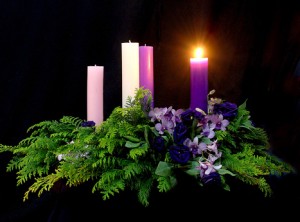
HOPE IS FIDELITY TO THE PRESENT
Christian hope – and hopes – is not “a pie in the sky,†but a commitment to change the present – our present. Rooted in the past, looking towards the future, Christian hope concentrates on the present, on the “nowâ€: God, the object of our hope is “the eternal now†(Hebr 3:7-8). The only thing in our hands is not the past or the future but the present. Hence, to be truly hopeful a Christian – and all people of good will – is faithful to the present. “I just keep concentrating on the present moment… Let us see each instant as if there were no other. An instant is a treasure†(St. Therese of the Child Jesus). This is also a Zen teaching: “The past is unreal. The future is unreal. Only the moment is real. Life is a series of moments either lived or lost.â€
What does it mean to live the present, this moment as if there were no other? It means to do what we have to do every moment, every “now†with love. To put love in our daily chores is to do good in every moment and to share it with others. After all, “only the love that we have accumulated throughout our lives stands out, and is the only good that will accompany us†(S. Galilea). “What are your plans for the future?†a journalist asked Blessed Mother Theresa of Calcutta. Her answer: “I just take one day at a time. Yesterday is gone. Tomorrow has not yet come. We have only today to love Jesus.â€
Fidelity to the “now†implies saying ‘yes’ to love and, therefore, ‘no’ to sin, which is a betrayal of love. It also implies to keep walking towards the future, towards God. In his moving Beloved Prophet, Khalil Gibran writes:
The physical consciousness of a plant in midwinter is not directed towards the past summer, but towards the coming spring. The physical memory of a plant is not that of days that are no more, but of days that will be. If plants are certain of a coming spring, through which they will come out of themselves, why can’t I, a human plant, be certain of a spring to come in which I will be able to fulfill myself? Perhaps our spring is not in this life.
Certainly, for those who believe – like the Christians -, the full spring is in the other life, in heaven. “Eye has not seen, ear has not heard nor has it so much as dawned what God has prepared for those who love him†(1 Cor 2:9).
Advent, then, is the proper season to examine our hope. How is our hope – and hopes?
Â
EXAMINING OUR HOPE – AND HOPES
Â
          How is my hope? I have this habit. Every Advent season I examine my human hopes and, particularly, my Christian hope. This meditation helps me animate and revive my hopes.
Some books and texts continue inspiring me as a pilgrim to eternal beatitude. I still remember – and go back to them from time to time – some books from my youth. In the first place, I recall The Little Prince by A. Saint-Exupery. Every time I read the dialogue between the Little Prince and the Fox I am moved. The Little Prince tells the fox that there are no hunters in his little planet; unfortunately for the fox, there are no chickens either: “Nothing is perfect†the fox comments before giving to the Little Prince his simple secret of life: “It is only with the heart that one can see rightly; what is essential is invisible to the eye.†On the pilgrimage of life, theological hope is essential!
I also keep treasuring the book The Parables of Peanuts (well, above all, the Peanuts comic strip) by Robert L. Short that helped me understand the good humor and the theology of Charles Schulz’s Peanuts Family of Charlie Brown, Snoopy, Linus, Lucy and other wonderful kids (adults). I continue enjoying The Way of a Pilgrim and the Russian Pilgrim’s continued mantra: “Lord Jesus Christ have mercy on me, a sinner.†Continuing conversion from sin renews our hope in God. Another traveling companion is The Prophet, by K. Gibran. I love Jonathan Livingstone Seagull (by R. Bach), the winged symbol of my hope. For Jonathan, “It was not eating that mattered but flight – more than anything else, he loved to fly! He was always on the way to a more perfect flight.†During his novitiate in flying, Jonathan was hungry but happy, because he was hopeful. ‘The trick,†he said, “is that we are trying to overcome our limitations in order, patiently.†Once, his mob of birds, interested only in eating, tried to kill him. Jonathan tried to help those hopeless seagulls by loving them! “You have to practice and see the real seagull, the good in everyone, and to help them see it in themselves.†This is love, or better, loving hope.
In a deeper sense, the Sacred Scriptures continue to be the best word on hope for Christians. One of my favorite texts on hope is from Isaiah: “Those who hope in Yahweh will renew their strength. They will soar as with eagle’s wings; they will run and not grow weary; they will walk and never tire†(Is 40:31). The Gospels in particular continue consoling us in the midst of the evil in the world and personal weakness and suffering. They present a portrait of Jesus Christ as our hope, and of his resurrection as the foundation of our hope. Indeed, what better inspiring words than these: In Christ we live; in Christ we shall die, and in Christ we hope to live forever (cf. I Cor 15:20-22).
The saints, particularly Mary the Mother of Jesus and our Mother, are excellent traveling companions. Their lives and works strengthen our Christian hope. Like any saint, Saint Augustine was a hopeful Christian – and writes powerfully and elegantly on life as a pilgrimage. St. Augustine’s Confessions is every time I meditate on it a renewed journey to deeper conversion – and hope! “Happiness does not consist in having more, but in needing less.â€
As a Dominican, St. Dominic, the apostolic and evangelical man, inspires my preaching and my life: the great Dominic, “never asking for reward, he just talks about the Lord.†Reading St Francis of Assisi who went through his journey of life giving thanks with hopeful love. St. Thomas Aquinas, the apostle of truth (Blessed John Paul II), one always learns something new: Every truth, he writes, “regardless who said it, comes from the Holy Spirit.†I continue feeding my roots – and my Christian life – with the works of St. Teresa of Avila and St. John of the Cross. Teresa is a perennial teacher on prayer. She advises us all: “Never leave prayer. There is always remedy for those who pray.†She consoles me: “Let nothing disturb you. / Let nothing frighten you. / All things pass away. / … God alone suffices†– Solo Dios basta! St. John of the Cross is a guide on the dark night of life: “Oh noche que guiaste./ Oh guiding night!/ O night more lovely than the dawn!/ Oh night that has united/ the Lover with His beloved,/ transforming the beloved in her Lover!â€
Among other helpful modern authors – also messengers of hope for me -, I wish to mention Henri Nouwen, Thomas Merton, Anthony de Mello, Paolo Coelho, etc.
CONCLUSION
Sometimes, I feel I am in the desert, alone facing the aridity and the loneliness of life. I try to realize then that my hope is a hope on the way – on the way of Christ, on the way of the cross! My Christian hope tries hard to be a prayerful, patient and persevering hope, to hope with others and for others – particularly with and for the poor. I pray to God – and ask others to pray for me – to help me hope against hope like Abraham (Rom 4:18), to keep my hope in gray days (Zc 4:10).
Facing injustice, violence, the death of innocent children – born and unborn -, the terrible sufferings of a loved person, one is tempted to lose hope. Why God’s apparent silence? I do not know, but I do know – and strongly believe – that He cares, because He loves us and his Son died for us! And I believe and hope in him and in his grace and love for me – for us. And I know that we march to the future – to happiness, to God, to Love, to heaven – with steps of love.
Will Jesus be born in our hearts this Christmas – and through life? The first time He came, there was no room for him in the inn. There will be no room for him this Christmas in the hearts that do not love. May we be ready to say: “Come, Lord Jesus, come!†(See Rev 22:17, 20).
May we all have a hopeful Advent and a peaceful journey of life!
                                            Â
FAUSTO GOMEZ BERLANA, O. P.
                                                       St. Dominic’s Priory,
Macau, Advent 2011
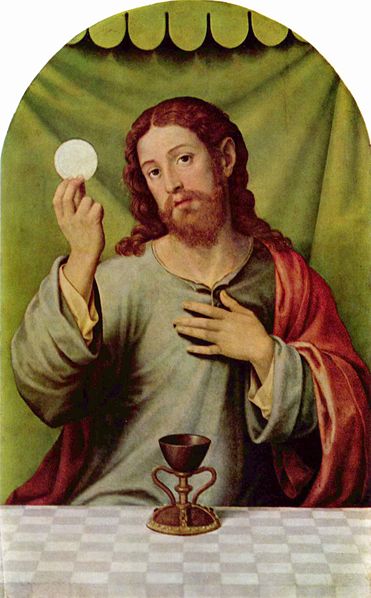
CORPUS CHRIST: THE MOST HOLY
BODY AND BLOOD OF THE LORD
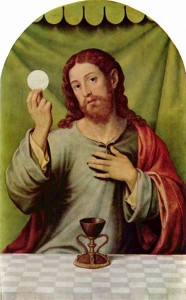
Corpus Christi is one of the greatest solemnities in the Christian calendar. Let us meditate briefly the meaning of this popular feast. We begin with the message from the Word of God.
- LITURGY OF THE WORD
First Reading: Dt 8:2-3, 14-16. “God fed you with manna…†He fed his people also with his words: “He fed you with manna in order to show you that not by bread alone does one live, but by every word that comes forth from the mouth of the Lord.â€
Second Reading: I Cor 10:16-17. Christ continues feeding us with his Body and Blood – with himself! Communion with the Lord is communion with the brothers and sisters for we all partake of one bread: “we, though many, are one body, for we all partake of the one loaf.â€
The Holy Gospel: Jn 6:51-58. This section is part of the difficult and challenging discourse of Jesus on the Bread of Life. To take part in the Eucharistic celebration means to enter into a close intimate relation with Christ here and hereafter: “I am the living breadâ€; “My flesh is true food and my blood is true drinkâ€; “Whoever eats my flesh and drinks my blood has eternal life.â€
What is the meaning of Corpus Christi for us?
2. MEDITATION
At first (and up to the 13th century), there was no particular feast for the Bread of Life; this was part of Holy Thursday. The Feast of Corpus Christi was instituted by Pope Urban IV in the year 1264. The Pope asked St. Thomas Aquinas to write the divine office of the Corpus Christi. The Angelic Doctor – master and mystic – wrote it, including the lovely hymns O Sacrum Convivium, Pange Lingua, Adoro te devote, Panis Angelicus, etc. The objective of the new feast was: To proclaim faith in the real presence of Christ in the Eucharist, in the Blessed Sacrament. We Christians believe that the Eucharist is the sacrament of sacraments (St. Thomas Aquinas), “the greatest gift of the Sacred Heart of Jesus†(Pope Paul VI), “the source and apex of the whole Christian life†(Vatican II, LG, 11). The Eucharist is
What is the Eucharist for us Christians?
Many wonderful things!
- The real presence of Christ: “This is my Body…†“This is the cup of my Blood.â€
- The sacrament and the sacrifice of Christ on the cross: source of grace and graces for our journey. “Do this in memory of me.â€
- The memorial of the death and resurrection of Christ. “Do this in memory of me.â€
- Pledge of heaven: “He who eats this Bread will live forever.â€
- The perfect prayer – of thanksgiving, petition, reparation and adoration.
How may we respond to Corpus Christi today?
3. RESPONSE
On this great feast, we Christians strengthen our faith in the Eucharist as a central mystery of our life. Christ is really present in the Eucharist! We adore him in the Blessed Sacrament. We visit him present in so many churches and chapels. At the beginning of this millennium, Blessed Pope John Paul II beatified Bishop Manuel Gonzalez, a servant of God totally dedicated to promote the devotion of the Blessed Sacrament, particularly with his visits to “Sagrarios abandonados†– “abandoned Tabernacles.â€
We receive Christ in the Eucharist. If properly disposed, we approach the Table of the Eucharist of the Mass; earlier we approached the Table of the Word. With Christ as our Eucharistic Bread, we receive the brothers and sisters of Christ. The Eucharist is a communion – and a call to unity (cf. I Cor 10:16-17). The Eucharist is “one Bread that helps us behave as one Body, as one People.â€
Blessed John Paul II wrote: “Thus the Lord unites us with himself through the Eucharist – Sacrament and Sacrifice – and he unites us with himself and with one another by a bond stronger than any natural union; and thus united, he sends us into the whole world to bear witness, through faith and works, to God’s love†(SRS 48).
In this glorious and colorful solemnity of Corpus Christi, we Christians are asked by Jesus our Lord and Savior to break bread and share the Bread of Life – our life – with others, particularly with those who have no bread. Indeed, man does not live by bread alone, but he cannot live without bread! In the evening of life, we all shall be examined on love, above all, on love of the poor! Jesus will ask you zand me then: I was hungry, did you give me bread, or manna, or rice? (See Mt 25:31:46).
Corpus Christi is indeed a most significant feast for all Christians. No wonder that Sunday was so essential in the life of the Christians of the first centuries! They all went to Mass – for “the breaking of the Bread†-, even if it was forbidden to them by “pagan†governments. When Christians were caught celebrating the Mass by the civil authorities, they were sent to jail. The judge asked them: “Why do you celebrate underground your rituals on Sunday, when you know that, if caught, you will end up in jail? The Christians answered as one: “We are Christians, and it is impossible for us to live without the Eucharistâ€; “Without Sunday, we cannot live.â€
May we live without the Sunday Eucharist?
May Mary, the Mother of Jesus and our Mother lead us to a fuller understanding of the Eucharist and consequent commitment to sharing Word and bread with others!
Let us close with the beautiful prayer O Sacrum Convivium:
“O Sacred Banquet, in which Christ is received, the memory of his passion is recalled, the soul is filled with grace and a pledge of future glory is given us. Amen.â€
FAUSTO GOMEZ, O.P.
St. Dominic’s Priory
Macau, June 26, 2011
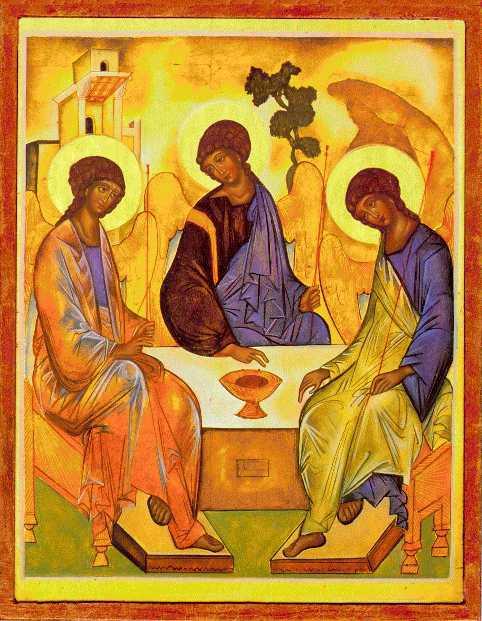
TRINITY SUNDAY

We celebrate today the Solemnity of the Most Blessed Trinity, or the Trinity Sunday (A), which is the central mystery of our Christian faith.
We have just proclaimed the Word of God, what does it tell us?
- LITURGY OF THE WORD
First Reading: Ex 34:4-6, 8-9. The first time Moses went up to Mount Sinai, the people of Israel abandoned their God and worshiped a golden calf. The second time he went up, Moses asked God to please forgive the people their grave sin of idolatry. God forgives them and describes himself thus: “The Lord, the Lord, a merciful and gracious God, slow to anger and rich in kindness and fidelity.†In the Old Testament God is not yet revealed explicitly as Trinity but as the one – “I amâ€- who is merciful and gracious!
Second Reading: 2 Cor 13:11-13. Paul asks the Corinthians – and all of us – to love one another with the love of Christ, and invokes the blessing of the Holy Trinity: “The grace of the Lord Jesus Christ and the love of God and the fellowship of the Holy Spirit be with all of you.â€
The Holy Gospel: Jn 3:16-18. It is part of the dialogue of Jesus with Nicodemus, the Jewish Rabbi who visited Jesus at night, and the section where three great values of our Christian faith are underlined. First value is love: “God so loved the world that he gave his only Son.†The second value is faith: “Everyone who believes in Jesus will not be condemned,†but saved. The third value is life: “â€He who believes in me…might have eternal life,†which is the true and full life. These three values – love, faith and life – “describe us as Christians, direct us on our journey and make us ready to witness them in our life†(José-Ramón Flecha).
What is the meaning of the Blessed Trinity in our life?
- MEDITATION
The Mystery of the Blessed Trinity is indeed the central mystery of our faith. We were baptized “In the name of the Father and of the Son and of the Holy Spirit.†We often make the Sign of the Cross “In the name of the Father and of the Son and of the Holy Spirit.†We end the recitation of the Psalms, , of the Mysteries of the Rosary and of our prayers with the “Glory be to the Father and to the Son and to the Holy Spirit.†And we make acts of faith, hope and love to God the Father, God the Son and God the Holy Spirit.
Our God is One and Triune, unity and communion, One God and Three different Persons, or three different relationships: of the Father to the Son, of the Son to the Father, and of the Father and the Son to the Holy Spirit. The Blessed Trinity! Like three faces of the same God, or “three caresses of love,†or “one love and three loversâ€!
The mystery of the Trinity is an unfathomable mystery. An old priest who is a bit hard of hearing asks his high school class of religion: “Who is the Trinity?†A boy at the back of the class, on the last row, who had a soft voice answered: “Father, Son and Holy Spirit.†The good old priest tells him: “I cannot understand.†The smart boy answered him: “Father, you are not supposed to understand; it is a mystery.†Yes, a deep mystery we strongly believe in and cannot understand – a mystery we can unveil little by little the more we live our faith in love, as the saints tell us. St. Teresa of Avila, for instance, could see clearly that God is One and Triune at the same time.
What is the meaning of the mystery of the Blessed Trinity?
God is Father, Father/Mother! The first Person of the Blessed Trinity created us and loves us. He is our Life, our Creator and Father.
God is Son! The second Person of the Blessed Trinity becomes man for our sake, and reveals to us God as Father. He, Jesus Christ, dies for us and rises from the dead and sends to his disciples the Holy Spirit, the Spirit of the Father and the Son. He is God and Man, our Savior and Redeemer.
God is the Holy Spirit! The third Person of the Blessed Trinity is the Love of the Father and the Son, God as Grace, Love and Peace, God our advocate and consoler.
Who are Father, Son and Holy Spirit for us?
- RESPONSE
The Blessed Trinity is communion – community of love! We are Christ’s community of faith, hope and love called to live in communion and to sharing with one another and the needy. Our God is not a solitary or lonely God. He is communion and a constant invitation to us to live in the communion of love.
God the Father is the Father of the prodigal son and of the lost sheep who loves us, who forgives us. We are God’s children. Therefore, let us behave as obedient and humble children.
God the Son is the Way we have to walk, the Truth we have to know and communicate to others, and the Life we have to live – a life centered on love of God, neighbor and needy neighbor in particular. Christ is our brother, and in him we are each other’s brother and sister.  Christ is our friend. Therefore, let us behave as brothers and sisters – as friends- of one another.
God the Holy Spirit is the grace of God in us. He dwells in us with the Father and the Son (the awesome indwelling of the Blessed Trinity!). He is the grace that helps us to pray, to be in solidarity with one another, and to work for justice and peace. Therefore, let us be and become more truly people who walk according to the Spirit by our good deeds of kindness, compassion, forgiveness, and hope.
On the Solemnity of the Blessed Trinity, we are asked to examine our faith and devotion to the Three Persons of the Blessed Trinity. We are urged to examine the primordial Trinitarian attitude in our life: the filial attitude (we are children of God), the fraternal attitude (we are brothers and sisters of Christ and in Christ of one another), and the charismatic attitude (we are prophets or witnesses of the love of God the Father through the Son in the Holy Spirit).
With St. Paul I repeat joyfully: “The grace of our Lord Jesus Christ and the love of God and the fellowship of the Hoy Spirit be with you all.â€Amen
FAUSTO GOMEZ BERLANA, OP
St. Dominic’s Priory
Macau, June 19, 2011
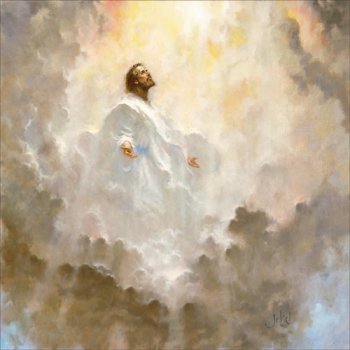
THE ASCENSION OF OUR LORD
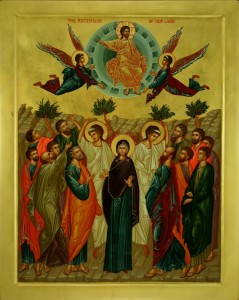
The Ascension of Our Lord Ss. Peter and Paul Orthodox Church Ben Lomond, California
Christian faith is the paschal experience: encountering the Risen Lord and witnessing his resurrection in life. The Lord’s resurrection includes his Ascension to heaven, his goodbye to his disciples and followers.
In the Christian world, the Ascension of our Lord Jesus Christ is celebrated as a great feast, that is, a solemnity. In fact, it has been traditionally considered one of the most important solemnities. There is a Spanish saying that goes this way: “Three days are in the year shining more than the sun: Holy Thursday, Corpus Christi and the Day of the Ascension.â€Â (“Tres dÃas hay en el año que relumbran más que el sol: Jueves Santo, Corpus Christi y el DÃa de la Ascensiónâ€).
The four gospels speak explicitly or implicitly of Jesus’ Ascension (see Mt 28:20; Mk 16:19; Lk 24:50-51; Jn 20:17). Luke also mentions the Ascension in his Acts of the Apostles (1:9).
What is the meaning of the Ascension for us?
MEDITATION
The Lord’s Ascension is an integral part of the paschal mystery, which began with the death and resurrection of Jesus, continues with his Ascension and closes with Pentecost or the Coming of the Holy Spirit. The Ascension signifies the triumph, glorification and enthronement of Jesus in heaven at the right hand of God the Father.
On the Ascension of our Lord, two points may be underlined. Number one: Jesus is going up to heaven but not as he came down from heaven. Why? Because Jesus came down from heaven as the Son of God, and He goes up to heaven as the Son of God and also as the Son of Mary: as our Lord and brother! Number two: Jesus goes up to heaven without really leaving us. He stays with us as the Risen Lord, that is, He is not physically but spiritually present in and among us: present in the Holy Spirit He sends to us – the Spirit of the Father and the Son. The real presence of the Blessed Trinity in us is the presence of grace and love, of God’s grace and love.
Saint Mark tells us beautifully that the Lord “acted in them,†that is, He led Jesus’ disciples in the mission of proclaiming the Good News of salvation. Matthew gives us these consoling words of Jesus before He goes up to heaven: “I will be with you until the end of time.†He continues to be with us really in the Eucharist, in common and fraternal prayer, in the neighbor – especially the poor neighbor -, in those who evangelize for the Lord.
Ascension is not a change of place for Jesus. We must avoid the danger of “boxing†Jesus in heaven, away from us (Andrés Pardo). After all, heaven is for us living in God’s presence – a presence which begins here with grace and ends in heaven with glory.
Do we really care about heaven? Heaven does not have a good press today. Seldom we read an article on heaven or hear a sermon on heaven. After all – some say -, we know very little about heaven, which is true: Heaven is Mystery. I remember the story of a doctor and his terminally ill patient, who was very scared of dying. The patient asked his physician: “What is there in heaven?†The physician answered: “I do not know.†The patient: “You do not know? How come? You are a devout Catholic and daily Mass-goer!†At that time, there was a big noise produced by someone who wanted to force the door of the clinic open. It was a big dog. Entering the clinic, the dog runs, jumps, and embraces and kisses the doctor. The physician tells his patient: “Did you see my dog? He did not know what was in this room, but he knew that someone, his master was here, and that was enough for him. I do not know what is in heaven, but I know one thing: God my Father is there, and that is enough for me.â€
Saint Luke tells us in Acts that the disciples looked up to heaven as Jesus went up. They seemed to enjoy that vision. But an angel said to them: “Go down and be witnesses of the Good News of the Lord.â€Â Saint Matthew for his part tells us that before leaving Jesus told the disciples: “Make disciples from all nations and peoples; baptize them and teach them to live according to the Good News of salvation.†According to St. Mark, Jesus tells the apostles to preach the Good News to the whole creation.
RESPONSE
How may we, disciples of Jesus today, respond to his Ascension?
First, let us reaffirm our faith in Jesus – in his Gospel, in heaven. Saint Paul tells us that we are citizens of heaven.
Second, let us commit ourselves in a deeper way to be witnesses of the death and resurrection of Christ, that is, dead to sin (to selfishness, to injustice, to violence) and alive in love for God and all neighbors, particularly the needy and poor neighbors.
Third, let us realize more fully our identity as pilgrims on the way to heaven: to living in the full presence of God after this earthly life. A 90-year old Dominican priest was asked: “How are you today?†His answer: “Very well, one day closer to heaven.â€Â How are we today, my friends?
I wish to share with you a lovely and well-known story. There was an old man trying to climb the Himalayan Mountain on a cold and rainy winter day. The old man stopped for a while in an inn along the path to the top. The innkeeper asked the old man: “How will you ever get to the top in this kind of weather?†The old man answered: “It will not be so difficult: my heart got there first, so it is easy for the rest of me to follow.â€
Dear co-pilgrims, where is our heart? Saint Paul encourages you and me: “With the goal in view, let us press on,†let us go on journeying towards heaven, where there will be no death, no mourning, but life, love and happiness. Meanwhile, let us walk with others and for others; let us love God, neighbor, creation. We remember the words of St. Augustine: we can only walk forward to heaven with steps of love!
According to Saint Luke, Jesus before ascending up into heaven blessed his disciples. “As He blessed, He left them, and was taken up to heaven. The disciples felled down to do him reverence, and then returned to Jerusalem filled with joy.†We are Jesus’ disciples today. May He bless us all! And may we be joyful, for we are Easter People: Easter People not only during Easter but through life. The Easter season reminds us every year of Easter as an attitude of life – of our life as a pilgrimage to the house of the Father.
FR. FAUSTO GOMEZ BERLANA, OP
Macau, May 2011.
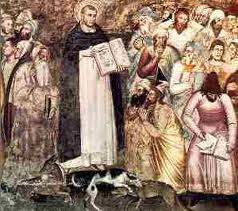
The Feast of the Translation of St. Dominic is certainly a good occasion for us to pause and ask ourselves what this day means for us, the sons and daughters of our Holy Father St. Dominic.
 In 1221 our Holy Father St. Dominic died and was buried under the floor of the friars’ Church of St. Nicholas in Bologna.  The friars were so engrossed with their work of preaching that they did not bother with such a simple burial place for such a great saint! On the other hand, the members of the faithful would go to the church to pray day and night at the tomb of Dominic.
They tried to adorn the tomb and some friars were greatly bothered by this. In the next few years the community grew in numbers and the church was too small so a new church was built. The new design left Dominic’s burial site outdoors subject to rain and the natural elements. The friars who lived with Dominic were distressed to see his tomb left in such a poor area.
Meanwhile a great revival of preaching was taking place in Lombardy. Both the Dominicans and the Franciscans were involved in this work. The Franciscans were zealous in preaching the virtues of their canonized Founder, Francis and their brother Anthony of Padua. Francis had been named a saint only two years after his death, and Anthony in just one year. This prompted the Dominicans to do something about Dominic.
In 1233 before the General Chapter, Jordan of Saxony, Master of the Order of Preachers and Dominic’s successor, agreed that the tomb of Dominic would be opened and the body to be moved to a more fitting place in the new church. But this decision caused great tension.
Would the friars find evidence of sanctity? What about the people who had been venerating Dominic ? Furthermore, this matter would have to be made public and would involve notification to the public authorities and to the Pope.
Friar Ventura, prior of the community at Bologna, relates the following, which was presented, as his testimony for the canonization of Dominic. The report begins with the year that Dominic died:
“ That year everybody noticed an extraordinary fragrance in the whole church, especially near the tomb, and the witness in particular says that he noticed it himself. There were also a lot of miracles worked that year and in the following years for people who came to the tomb of the blessed Dominic bringing was images and all of things. When several people tried to present silk cloths to cover the tomb of blessed Dominic, the brethren would not allow them to do so, for fear they would be accused of greed.
When the body of the blessed Dominic was due to be moved, for several days, many noble citizens guarded it to prevent it from being stolen. When the tomb was opened, in the presence of many citizens of Bologna and other noble men, including religious, bishops and laymen, the brethren found a wooden coffin, shut with iron nails, and such a sweet smell came out that they were all amazed, saying that they had never smelled anything like it. So the tomb, and the extraordinary fragrance remained the whole time. Master Jordan of Saxony held the holy body in his hands and gave it to the three hundred or so brethren who had come to the General Chapter to kiss.  When the witness was asked how he knew all this, he said that he was present at all of it.
Friar Ventura ends his memories recalling Dominic’s charity. Jordan of Saxony concludes his “little book†On the Beginnings of the Order of Preachers describing Dominic’s charity. Dominic himself ended his life speaking to his brothers about charity: “Have charity for one anotherâ€
It is really this heroic charity of our Father Dominic that points to the deepest reason that we celebrate this Feast Day. It was charity that drew the humble to his grave in death. It was his preaching and the example of his life, lived in charity that attracted men in record numbers to the Order of Preachers in his life. Today, it is the holiness of St. Dominic, and his charity that we proclaim, and with all humility try to imitate, and May we also remember those words spoken of him: “He spoke only TO God, or ABOUT God.â€
FR. LIONEL XAVIER, OP

Feast of St. Catherine of Siena -Â Â 2011

Jesus is our bridge to Heaven.
( St. Catherine’s Principal teachings and spiritual development.)
St. Catherine is well known for using images in her writings.
And so in her Dialogue, we find among other images that
of the BRIDGE, which God himself used in one of their
exchange  of  words – He said :
“I told you that I have made a bridge of the Word ( JESUS ),
My only-begotten Son, and such is the truth.  I want you to
realize, my children, that by Adam’s sinful disobedience  the road
was so broken  up  that no one could reach everlasting life.
Since  they had no share  in the good for  which I had created them,
they   did not give me the return of glory they owed me,  and so my
truth  was not fulfilled.   What is this truth ?
That I had created them in my image and likeness so that they might
have eternal life , sharing in my being and enjoying  my supreme
eternal tenderness and goodness. But because of their sin, they
never reached this goal and never fulfilled my truth,  for sin closed
heaven and the door of my mercy.
This sin sprouted thorns and troublesome vexations.  My creatures
found rebellion within themselves,  for as soon as they rebelled
against me,  they became rebels against themselves.
With sin there came at once the flood of a stormy river that beat
against them constantly with it waves,  bringing weariness and
troubles from themselves as well as from the devil and the world.
You were all drowning,  because not one of you, for all  your
Righteousness,  could reach eternal life.
But I wanted to undo these great troubles of yours.  So I gave  you
A  BRIDGE,  my Son,  so that you could cross over the river,  the stormy
sea  of this darksome life, without being drowned . “
See how indebted to me are my creatures !  And how foolish to
choose to  drown rather than accept the remedy I have given them ! “
My dear brothers and sisters in Our Holy Father St. Dominic,
I am sure we have all seen the terrible scenes of the extremely
powerful devastating  force of the Tsunami which hit Japan recently,
as a  follow-up of the earthquake.
After reflecting on these words that God spoke to Catherine,
I began to realize how serious  SIN  is in the eyes of Almighty God.
We all saw how devastating were the waters of the tsunami,
washing away everything in its path…wiping out whole cities.
My dear Brothers and Sisters ,  yes,  the tsunami is a most serious
and powerful destructive force  of Nature,  but all that is destroyed
after all  is  the material side of life, even though Man himself
was also destroyed in many cases, and human relationship were lost.
BUT  when  the storm of life  coming through  SIN caused by
our following the  temptations of the Devil and the World,
strikes us …it is  eternal life  that is lost !
We are made in the likeness and image of God, to return to Him
after we have lived this life according to HIS WILL,  that is
to KNOW,  LOVE  and  SERVE HIM.
But since the road of life was destroyed by the spiritual tsunami
caused by Adam’s first sin,   we had no means of returning to
our heavenly home…
So, God is telling Catherine…I  have built this  BRIDE – which is
My only begotten Son,  Jesus Christ himself… who is the WAY
THE  TRUTH  AND THE  LIFE…    Follow  HIM  and you will  be
saved.
Yes, my dear brothers  and sisters,  we have THIS  BRIDGE –
are we not grateful to Our Lord  Jesus Christ for having accepted
HIS  Father’s  will  in  coming into our life,  lived  the difficulties
of human life,  suffered  the  insults,  the cruelties of his persecutors,
who rejected HIM  after all THE GOOD He had done for them …
and finally   even  condemned  HIM  to the most shameful, cruel form
of death –  the  Crucifixion   ?
And  Jesus did all this simply  out  of  LOVE  FOR  US,  nothing else.
And should we be so foolish as to drown in our sins of selfishness,
obstinacy  and  pride… rather than accept  JESUS  as  OUR  BRIDGE
TOÂ Â HEAVEN ?
(Fr. Lionel Xavier, OP)











